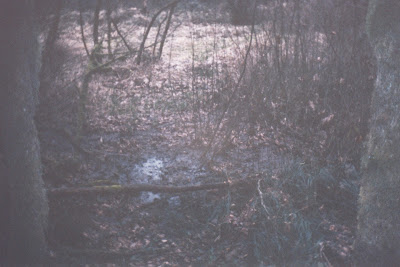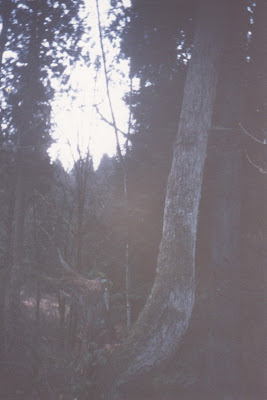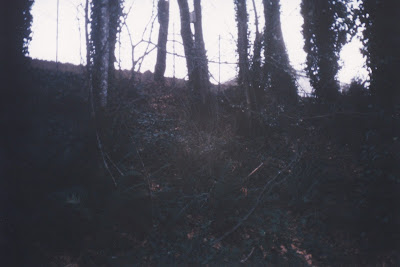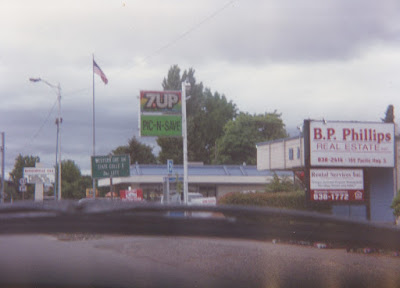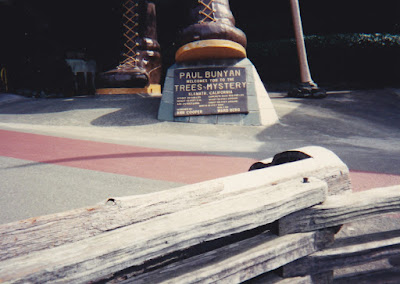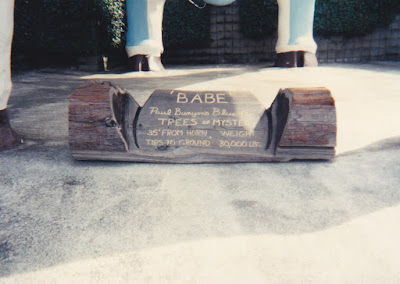Our family's last stop on our 1992 California trip was Trees of Mystery in Klamath,
California, on March 19, 1992. Trees of Mystery features a trail among a number
of unusual trees. It also features chainsaw carvings and a museum of Native
American artifacts.
One of the most impressive displays at Trees of Mystery is located at
the parking lot. Massive statues of Paul Bunyan and Babe, his blue ox, greet
visitors as they arrive.
The statue of Paul Bunyan weighs 30,000 pounds, and its concrete base
weighs 800,000 pounds. It is 49 feet 2 inches tall, with a waist 52 feet around
and a chest 66 feet around. The axe is 27 feet long and the boots are 10 feet
high. It was designed by Ann Cooper and built by Ward Berg.
The statue of Babe is 35 feet high from the ground to the tips of the
horns, and weighs 30,000 pounds.
 |
| Photo by Cliff West |
Trees of Mystery first opened in 1946, and the first statue of Paul Bunyan was erected there that year, but it was promptly destroyed by the rain that winter. The current Paul Bunyan statue was built in 1961 and Babe was built in 1952.
 |
Photo by Cliff West
|
The statues are constructed primarily of wood, chicken wire, and stucco. Paul Bunyan can wave his hand, turn his head, and wink. Before the statues were relocated to their current position in 1983, Babe could nod and blow smoke out of his nostrils.
 |
| Photo by Cliff West |
One of the first trees encountered at Trees of Mystery is the Family
Tree. Twelve Sitka spruce trees grow from one trunk 32 feet around. The
additional trees grow out of the branches of the main tree.
 |
| Photo by Cliff West |
Here are a group of trilliums that were growing along the trail.
 |
| Photo by Cliff West |
This is the "Upside Down" Tree, though it is not really
upside-down. It is really more sideways, with a horizontal trunk growing out of
a vertical trunk. The horizontal trunk curves wildly and even crosses over the
trail.
 |
| Photo by Cliff West |
The "Upside Down" Tree has two trunks and two root structures.
One tree grows horizontally and the other growing vertically through the
horizontal trunk. The horizontal tree is always seeking sunlight.
 |
| Photo by Cliff West |
This is the Octopus Tree. It gets its name from it's tangled web of
exposed roots that look like tentacles. These roots also create an open space
under the Octopus Tree called Nature's Underpass that children can crawl
through.
 |
| Photo by Cliff West |
The Octopus Tree also features a sign that reads "These are the
trees you have seen in Ripley's Believe It or Not."
 |
| Photo by Cliff West |
I don't know the name of this tree formation. There is a sign on it but
it is not readable in the photograph; I think it says "SUN _". These
trees are twisted around one another, as they each try to get as much sun as
possible.
 |
| Photo by Cliff West |
In this picture is the Lightning Tree, named for the jagged shape of its
trunk which makes it look like a bolt of lightning.
 |
| Photo by Cliff West |
I think this is the Cathedral Tree, a group of nine trees growing
together in a semicircle around the root structure of a dead tree that has
since rotted away. Weddings and Easter services have been conducted here.






